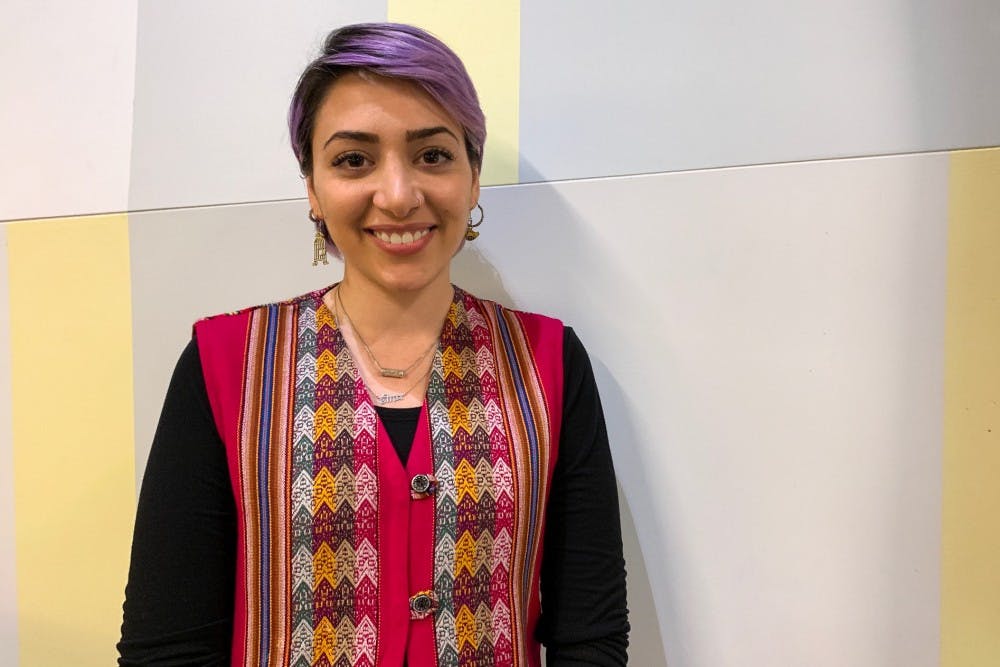The red carpet is star-studded with beautiful gowns and immense talent but always seems to be lacking in one, large, overarching group: minorities. According to ASU senior film and media production student Maedeh Moayyednia, that needs to change.
Moayyednia, a senior majoring in film and an Iranian immigrant, is the recipient of the spring 2019 Outstanding Undergraduate Award for the ASU Herberger Institute for Design and the Arts. She said the issue that the media industry faces with misrepresentation of minority groups has reached a point where it must do "damage control."
The recipient of the Outstanding Undergraduate Award is nominated by professors and faculty members from each of the different schools in the Herberger Institute, according to the college's faculty. The finalists are then sent to the ASU Alumni Association, which selects one student to receive the award.
Moayyednia first moved to the U.S. in October 2014 to escape the religious discrimination she was facing from her own country of Iran. She said she came to the U.S. alone with nothing but a language barrier and a dream to make a difference.
She said while living in Iran, she studied sociology at the Bahá'í Institute for Higher Education (BIHE), a college built to enable religious minorities, like Moayyednia, to pursue higher education.
During her time at BIHE, she said her professors were put in jail because religious minorities in Iran were not allowed to be in the educational system. She said she watched her friends be jailed for standing up for their own rights.
“I want to tell them that I will do my best to help their voices be heard around the world,” she said, referring to friends and family in Iran. “I want to promise them that I will give voice to all their stories and to honor them.”
Moayyednia said due to the harsh restrictions regarding speaking, publishing or writing original ideas, she came to the conclusion that if she wanted to apply the knowledge she had gained in her four years at BIHE to make a serious change, she would have to leave her hometown of Iran.
She said she blames the discrimination on the generational divide in Iran. While she said the younger population are more open to new ideas, the older generations and the government remain far more traditional.
“The government discriminated so much against me and my family as a religious minority, but the government is so separate from people,” she said. “... And the people are kind.”
Moayyednia said she wants to change the current dialogue about the stereotypes of Middle Eastern people that she said can sometimes be exaggerated in the media.
“I want to talk about all the good things," she said. "I want to talk about how kind Muslim people are I want to talk about all these beautiful, historic places that are in Iran."
Moayyednia said film inspired her because it was the type of art that she believed could reach the largest amount of people internationally.
“As a person and as a filmmaker, I think it’s my responsibility in this day and age to bring them back to life and give a voice to the people who never had a chance to tell their story,” she said.
She said she has also made it her own mission to change people's perspective on groups that are often overshadowed, including immigrants, religious minorities, people of color, LGBTQ community, women and other marginalized communities. She described this necessary shift in focus as “damage control.”
“We need to tell stories that matter and help make society a better place to live for everybody," she said. "We need to open up these conversations and make people think about it.”
Moayyednia said in pursuit of this goal, she participated in the “Dear Women in Film” campaign for the ASU Herberger Institute for Design and the Arts, which is intended to inspire women to pursue careers in a male-dominated film industry.
Rebekah Cheyne, the senior videographer for the ASU Herberger Institute for Design and the Arts and director and producer for the “Dear Women” video, said Moayyednia’s own values reflected exactly what the campaign was all about.
“She is so purposeful when it comes to the work that she does, and that is really the intent of ‘Dear Women,’” Cheyne said. “Every single thing she works on and touches ends up being personal in some way.”
Ellie Borst is the executive editor of The State Press, overseeing the publication and its four departments: online, magazine, multimedia and engagement. She plans to graduate in May 2022 with her master's in legal studies and got her bachelor's in journalism in 2021. Previous roles she has held since joining SP in 2018 include digital managing editor, magazine managing editor, community and culture desk editor, and arts and culture reporter.




